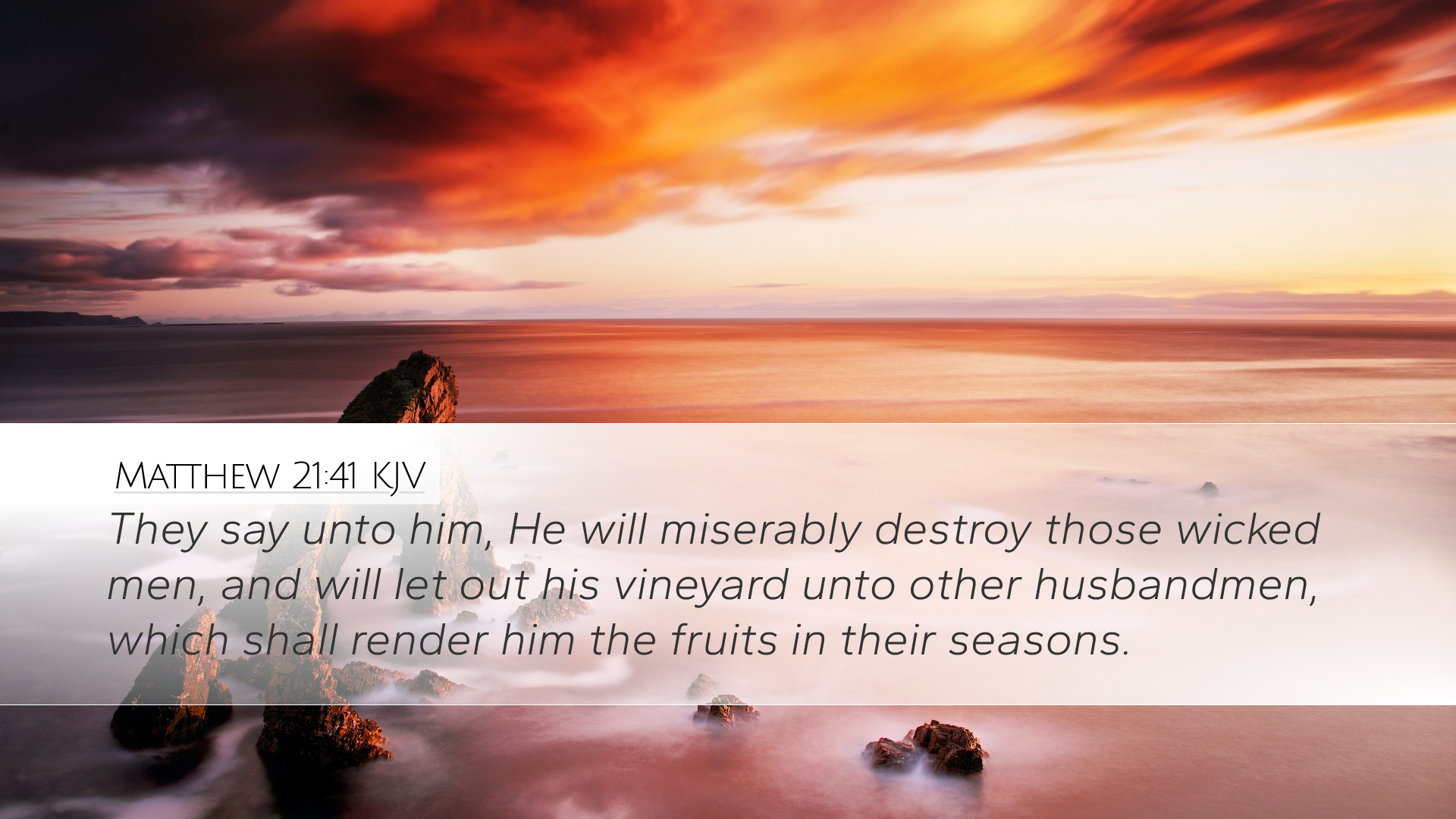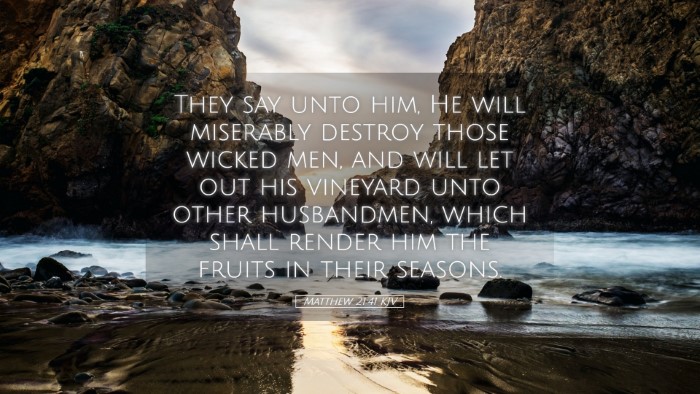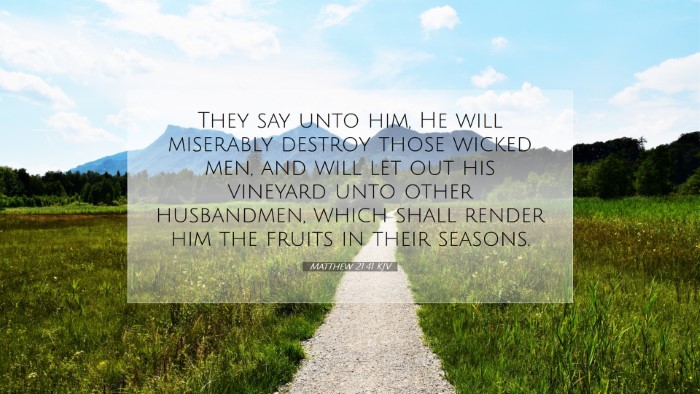Commentary on Matthew 21:41
Verse Context: Matthew 21:41 reads, "They said to Him, 'He will bring those wretches to a wretched end, and he will rent the vineyard to other tenants, who will give him his share of the crop at harvest time.’" This verse is part of the parable of the wicked tenants, delivered by Jesus as a prophetic indication of judgment upon Israel and its leaders. Understanding this passage in its cultural and theological context is essential for appreciating its deeper meanings.
Insights from Matthew Henry
Matthew Henry emphasizes the authority of God in appointing leaders and the responsibilities that come with such appointments. The vineyard represents Israel, and the tenants are its religious leaders who are charged with nurturing it. However, they have been unfaithful and abusive, failing to honor the owner's expectations.
- God's Ownership: Henry notes that the parable illustrates God’s ultimate ownership over His people. The vineyard is a common biblical metaphor for Israel (Isaiah 5:1-7), showing that they were selected to bear spiritual fruit.
- Unfaithful Stewardship: The wicked tenants represent a failure in stewardship. Instead of producing fruits of righteousness, they resort to self-interest and violence against the owner's servants, indicative of the prophets sent by God.
- God’s Judgment: Henry articulates that the tenants' fate signifies God's impending judgment on those who mislead His people, aligning with a broader theme of accountability throughout scripture.
Insights from Albert Barnes
Albert Barnes expounds on the prophetic nature of this parable, underlining the Lord's foreknowledge of Israel's rejection of His messengers. Barnes sees the vineyard as not just a metaphorical representation but a direct commentary on the Jewish leaders' behavior.
- Divine Wrath: Barnes asserts that the expression of bringing "wretches" to a wretched end signifies a divine retribution. The Jewish leaders, who were entrusted with the care of God's people, would face dire consequences for their disobedience and rejection of Christ.
- Transference of Responsibility: The idea of renting the vineyard to other tenants is profound. It symbolizes the transition of God's favor from Israel to the Gentiles, thus emphasizing the mission of the church to bring forth fruit where the traditional religious structures had failed.
- The Urgency of Response: Barnes encourages readers to recognize the urgency embedded in this parable, calling for a sober reflection on personal and communal stewardship in faith.
Insights from Adam Clarke
Adam Clarke offers a detailed examination of the parable's implications for contemporary believers and the historical context of its audience. He provides a nuanced reading of the social structures in place when Jesus spoke these words.
- Cultural Significance: Clarke discusses the socio-political realities of first-century Judea. The Jewish leaders were in a position of power yet lacked true spiritual authority, leading to a disconnect between God’s intentions and human actions.
- Reinterpretation of the Covenant: The notion that the vineyard would be taken from the unworthy tenants speaks to the redefinition of God’s covenant community. Clarke sees this as a pivotal moment in the redemptive history where the church emerges as the new Israel.
- Call to Faithfulness: Clarke highlights the necessity for faithfulness in leadership and the key role of obedience in the life of believers. He urges modern readers to reflect on their commitments to God's work and the consequences of neglect.
Theological Implications
The parable expresses several crucial theological themes. Firstly, the sovereignty of God is evident; He is the owner of the vineyard, asserting His right to expect a return on His investment in people. Secondly, the theme of judgment resonated strong with the original audience and still admonishes the church today about the gravity of disobedience.
- Judgment and Mercy: While God judges the tenants for their actions, there is also an element of mercy in His desire for them to produce fruit. This paradox invites deeper theological reflection on the nature of divine grace and human responsibility.
- Call to Repentance: The narrative serves as a divine call to repentance for both the Jewish audience and modern believers, emphasizing that continued unfaithfulness leads to exclusion from God’s plans.
- Hope for the Future: Despite the solemnity of the warning, the implication of the vineyard being given to others offers hope that God’s plans cannot be thwarted and that He will always have a remnant who will respond to His call.
Conclusion
Matthew 21:41 challenges all who read it to reflect on their spiritual stewardship and the seriousness of their relationship with God. Through the insights gathered from public domain commentaries, it is evident that both historical context and theological depth provide a rich tapestry for understanding the implications of this parable. Pastors, students, theologians, and Bible scholars alike are urged to internalize the gravity of God's expectations and to commit to a life that bears the fruit of His Kingdom.


